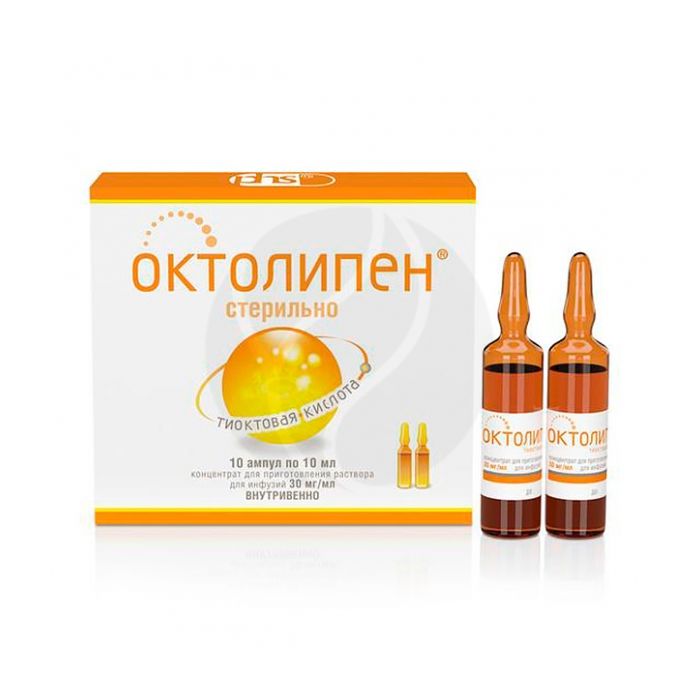Octolipen concentrate for the preparation of a solution for infusion 30mg / ml, 10ml No. 10
Russian Pharmacy name:
Октолипен концентрат для приготовления р-ра для инфузий 30мг/мл, 10мл №10
Diabetic polyneuropathy;
alcoholic polyneuropathy.
For the preparation of an infusion solution, 1-2 ampoules (300-600 mg) of the drug are diluted in 50-250 ml of 0.9% sodium chloride solution. The finished solution is injected intravenously. Apply at 300-600 mg 1 time per day for 2-4 weeks. In the future, they switch to oral therapy.
The drug is photosensitive, therefore, the ampoules should be removed from the package only immediately before use. It is advisable to protect the bottle with the solution from light during the infusion (you can use light-protective bags, aluminum foil). The prepared solution must be stored in a dark place and used within a maximum of 6 hours after preparation.
Active substance: thioctic acid (a-lipoic acid) - 300 mg
Excipients: ethylenediamine - 87.4 mg; disodium edetate (disodium salt of ethylenediaminetetraacetic acid) - 1mg; water for injection up to 10ml
Hypersensitivity to the components of the drug;
children under 18 years of age (efficacy and safety of use have not been established);
pregnancy and breastfeeding period.
Pharmacological properties
Thioctic acid (alpha-lipoic acid) is an endogenous antioxidant (binds free radicals), formed in the body by oxidative decarboxylation of alpha-keto acids. As a coenzyme of mitochondrial multienzyme complexes, it participates in the oxidative decarboxylation of pyruvic acid and alpha-keto acids. It helps to reduce the concentration of glucose in the blood and increase the glycogen content in the liver, as well as to overcome insulin resistance. By the nature of the biochemical action, it is close to the vitamins of group B. It participates in the regulation of lipid and carbohydrate metabolism, stimulates cholesterol metabolism, and improves liver function.
It has a hepatoprotective, hypolipidemic, hypocholesterolemic, hypoglycemic effect. Improves the trophism of neurons and axonal conduction, reduces the manifestations of diabetic and alcoholic polyneuropathy.
Pharmacokinetics
When administered intravenously, the maximum concentration is 25-38 ?g / ml, the area under the concentration-time curve is about 5 ?g h / ml. The volume of distribution is about 450 ml / kg.
It is metabolized in the liver by side chain oxidation and conjugation. Thioctic acid and its metabolites are excreted by the kidneys (80-90%). The half-life is 20-50 minutes. The total plasma clearance is 10-15 ml / min.
Side effects
Allergic reactions are possible: urticaria, systemic allergic reactions (up to the development of anaphylactic shock).
Symptoms of hypoglycemia may develop (due to improved absorption of glucose).
With intravenous administration, convulsions, diplopia are very rarely possible; punctate hemorrhages in the mucous membranes, skin; thrombocytopathy; hemorrhagic rash (purpura), thrombophlebitis.
With a quick introduction, an increase in intracranial pressure is possible (the appearance of a feeling of heaviness in the head); difficulty breathing.
The listed side effects go away on their own.
Overdose
Symptoms: headache, nausea, vomiting.
Treatment: symptomatic. There is no specific antidote.
Interaction with other medicinal products
Thioctic acid (in the form of a solution for infusion) leads to a decrease in the effect of cisplatin.
With simultaneous use with insulin and / or oral hypoglycemic agents, an increase in the hypoglycemic effect is observed.
Thioctic acid forms difficultly soluble complex compounds with sugar molecules. The prepared solution is incompatible with glucose solution, levulose, Ringer's solution, as well as with compounds (including their solutions) that react with disulfide and SH-groups.
special instructions
In patients with diabetes mellitus, especially at the beginning of treatment, frequent monitoring of the concentration of glucose in the blood is necessary. In some cases, a decrease in the dose of hypoglycemic agents is required.
During treatment, it is necessary to strictly abstain from drinking alcohol, since when exposed to alcohol, the therapeutic effect of thioctic acid is weakened.
Ethanol reduces the therapeutic efficacy of thioctic acid.

